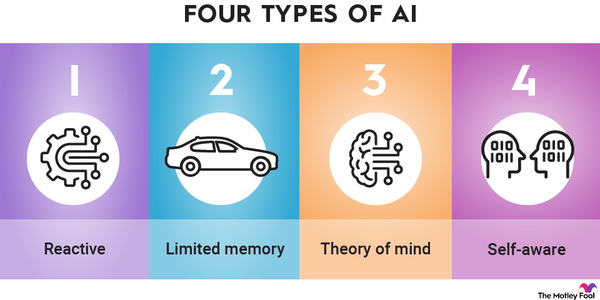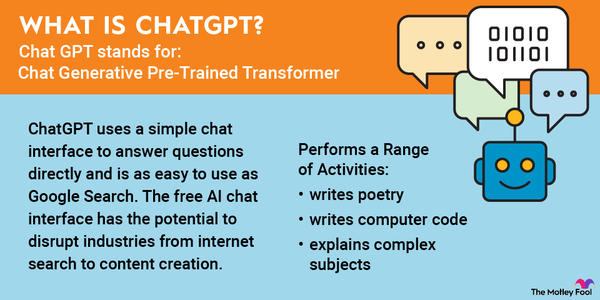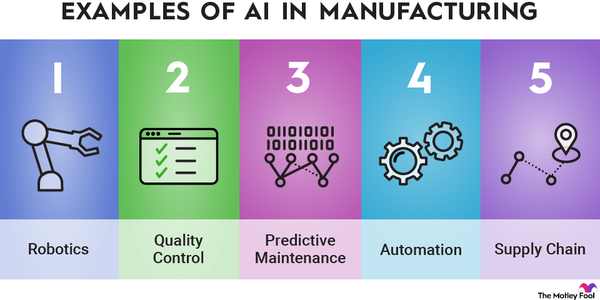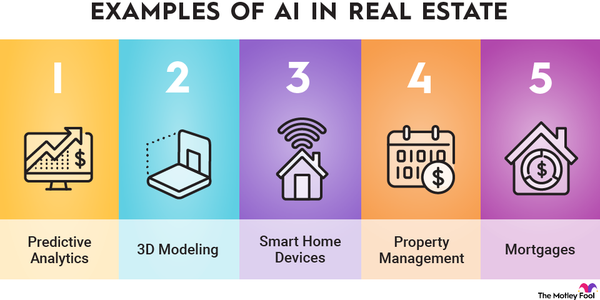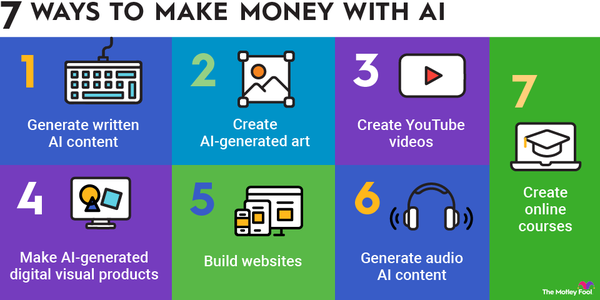There's no shortage of hype around artificial intelligence (AI) these days. Investors are piling into AI stocks, and AI has become the latest buzzword in corporate America. Mentions of AI have soared on earnings calls, and analysts are peppering CEOs with questions about how they're using new AI tools like ChatGPT.
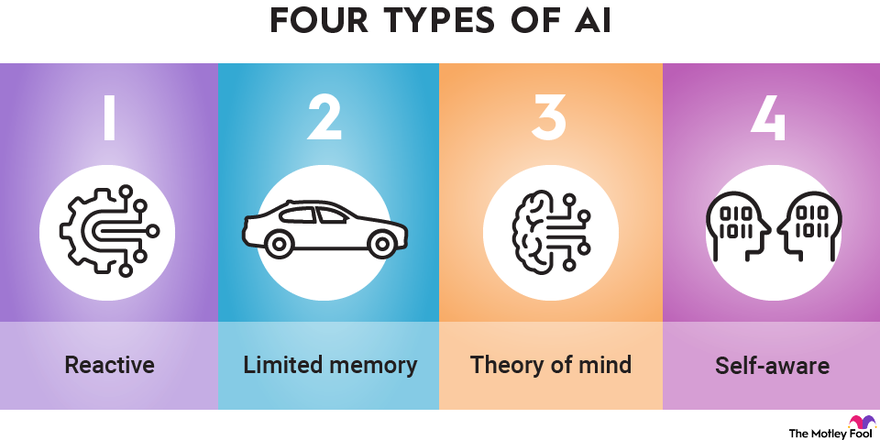
If you're a beginning investor who's interested in investing in AI, however, you may not know where to start. As with any emerging technology, there's a lot of noise around AI, and it can be difficult to separate the important signals.
In this look at AI investing for beginners, we'll review the meaning of artificial intelligence and the four types of AI, discuss some options for investing in AI, and explore the pros and cons of AI investing and whether it's the right move for you.
Four types
Four common types of AI
Artificial intelligence generally refers to computers and machines doing tasks, such as machine learning, that normally require human intelligence or to the ability of computers to learn to recognize patterns and draw conclusions by being trained with data.
Artificial Intelligence
According to today's classification system, there are four primary types of AI: reactive, limited memory, theory of mind, and self-aware.
1. Reactive AI
Reactive AI is considered the most basic form of AI. As the name suggests, it describes a type of AI that provides a predictable response to the information it receives. Unlike other forms of AI, reactive AI cannot learn from previous actions. Some examples include Deep Blue -- IBM's (IBM 0.01%) chess-playing supercomputer -- and spam filters that sort emails.
2. Limited memory AI
Limited memory AI is the next-most evolved form of AI. It's able to learn from experience and combines it with pre-programmed information to complete difficult tasks. It's the most common form of AI today.
For example, autonomous vehicles use limited memory AI to interpret the movements of other cars around them and respond accordingly. The information is not saved in the car's long-term memory because it's unneeded.
3. Theory of mind AI
Theory of mind AI refers to an AI with advanced decision-making capabilities similar to humans. They can understand and remember emotions and adjust their behavior accordingly. Researchers are still working on developing a theory of mind AI.
4. Self-aware AI
Finally, self-aware AI is considered the most sophisticated form of AI; it describes machines that are aware of their emotions and the emotions of those around them.
This type of AI may still be in the distant future and is the kind that worries technologists and others who have said that AI could be a threat to humanity.
How to start investing in AI
How to start investing in AI
There are a number of ways to get exposure to AI stocks, but they predominantly fall into two categories. You can invest in AI exchange-traded funds (ETFs) or AI stocks. Let's look at some of the options in each one.
Global X Robotics & Artificial Intelligence ETF
The Global X Robotics & Artificial Intelligence ETF (BOTZ 0.7%) is the biggest AI ETF on the market, with net assets of $2.7 billion. The ETF's size helps make it more stable than some smaller funds and less at risk of redemptions (i.e., when investors take their money out of an ETF).
Global X Robotics counts as its top holdings Intuitive Surgical (ISRG 1.32%), the maker of the Da Vinci surgical robot; Nvidia (NVDA 3.43%), the top AI chipmaker; and ABB (ABBN.Y 0.92%), a Swiss manufacturer of automation and robotics, including electric vehicle charging infrastructure.
The fund has an expense ratio of 0.68%, making it reasonably affordable for investors looking for easy exposure to a diversified basket of AI stocks.
ROBO Global Robotics and Automation Index
The ROBO Global Robotics and Automation Index ETF (ROBO 1.35%) is only modestly smaller than the Global X Robotics ETF, weighing in with net assets of $1.08 billion. ROBO has some holdings similar to Global X Robotics but is more diversified, with no stock making up more than 2.5% of the fund; holdings in Global X top out at 10%.
Celestica (CLS 1.9%), a maker of complex electronic components for a wide range of industries, takes the top spot in this ETF, followed by Symbiotic (SYM 4.13%), which focuses on warehouse automation systems and robotics. ROBO's third-largest holding is Ambarella (AMBA 0.83%), a semiconductor company known for high-performance video technology and AI chips.
ROBO has an expense ratio of 0.95%, making it modestly more expensive than Global X Robotics.
Nvidia
If you're interested in AI stocks, Nvidia is a good place to start. Nvidia is the leading AI chipmaker; the company invented the graphics processing unit (GPU), which has become popular in applications such as gaming and cryptocurrency mining. Its GPUs are also useful for handling AI algorithms like those needed to run autonomous vehicles.
Nvidia has exploded past the $3 trillion market cap mark following several quarters of blowout growth. The company continues to impress Wall Street with the level of demand it's seeing for AI chips, including the new Blackwell platform, demand for which CEO Jensen Huang described as "insane."
Palantir
Another AI stock that has gotten a lot of attention is Palantir (PLTR -4.97%).
Palantir got its start providing deep data analytics to counterterrorism services in the federal government in the aftermath of 9/11. Its brand of software has since become known as data fusion, since it helps government agencies and businesses connect disparate data points to yield valuable information.
Palantir has also capitalized on the AI boom with the launch of its AI platform in 2023 and its revenue has accelerated for five quarters in a row since then.
Additionally, its profit margins have expanded rapidly as it gained traction with businesses and demonstrated demand for its AI applications.
Pros and cons
Pros and cons of investing in AI
| Pros | Cons |
|---|---|
| AI is a disruptive technology expected to add trillions in economic value. | It's hard to pick winners with an emerging technology. |
| Most companies are trying to leverage the power of AI. | The hype is palpable, and AI stocks could already be in a bubble. |
| The winners from the AI revolution could see huge stock gains. | There's still a lot of uncertainty around AI, especially on the regulatory front. |
Is AI investing right for you?
Is AI investing right for you?
AI investing isn't right for everyone, and as a beginner, it's a good idea to invest only a small portion of your portfolio in AI stocks, since this is a high-risk sector. Still, the upside potential could be enormous, so it makes sense to get at least a bit of exposure to AI stocks.
Consider some of the names above and focus on stocks with sustainable competitive advantages, both within artificial intelligence and outside of it.








